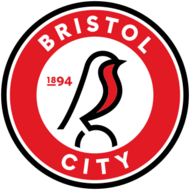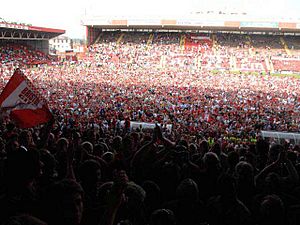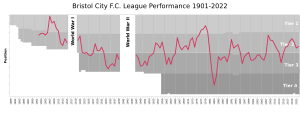Bristol City F.C. facts for kids
 |
||||
| Full name | Bristol City Football Club | |||
|---|---|---|---|---|
| Nickname(s) | The Robins, Cider Army, Red army | |||
| Short name | BCFC | |||
| Founded | 1894 | |||
| Ground | Ashton Gate | |||
| Capacity | 27,000 | |||
| Owner | Steve Lansdown | |||
| Chairman | Jon Lansdown | |||
| Head coach | Gerhard Struber | |||
| League | Championship | |||
| 2018–19 | Championship, 8th of 24 | |||
|
||||
Bristol City Football Club is a professional football team from Bristol, England. They play in the Championship, which is the second-highest league in English football.
The club started in 1894. They played in local leagues before joining the Football League in 1901. Bristol City won the Second Division in 1905–06. The next season, they finished second in the top league. In 1909, they reached the FA Cup final but lost to Manchester United. The team has moved between different leagues over the years. They have won the Football League Trophy three times. Since 2015, they have been playing in the Championship.
Bristol City's home stadium is Ashton Gate. They have played there since 1904. The team wears red and white. Their nickname is The Robins, and a robin has been on their badge for many years. Their main rivals are Bristol Rovers and Cardiff City.
Contents
Club History
Early Days and First Wins (1894–1922)
Bristol City started in 1894 as Bristol South End. Three years later, they became a professional club and changed their name to Bristol City. They joined the Southern League. In 1900, they joined with another local team, Bedminster F.C..
In 1901, Bristol City joined the Football League. They were one of the first clubs from the south of England to do so. Their first game in the Football League was a 2–0 win against Blackpool.
The team won the Second Division in 1905–06. They set a record by winning 30 games in a season. They also won 14 games in a row. In 1906–07, they finished second in the First Division, which was their highest league finish ever.
In 1909, Bristol City played in their only FA Cup final. They lost 1–0 to Manchester United. After five seasons in the top league, they were relegated in 1911. It took 65 years for them to return to the top flight. After World War I, they reached the FA Cup semi-finals in 1920. In 1922, they were relegated to the Third Division South.
Moving Up and Down (1922–1965)
The 1920s were a time of change for Bristol City. They moved between the Second Division and the Third Division South. They won the Third Division South title twice, in 1922–23 and 1926–27.
In 1934, they won the Welsh Cup. However, in the same year, they had their biggest league defeat, losing 9–0 to Coventry City. During World War II, part of their stadium, Ashton Gate, was damaged by an air raid.
In 1946–47, City had a record league win, beating Aldershot 9–0. In the late 1950s, the club spent five years in the Second Division. They returned to this league in 1965.
Back in the Top League (1966–1980)
In 1967, Alan Dicks became manager. The team improved and earned promotion to the First Division in 1976. This ended their 65-year wait to be back in the top league.
Between 1975 and 1981, City played in the Anglo-Scottish Cup. They won the trophy in 1977–78, beating St Mirren in the final. Their best finish in the top league during this time was 13th place in 1979.
Tough Times and Comeback (1980–2000)
In the 1980s, Bristol City faced financial problems. They were relegated three times in a row, ending up in the Fourth Division in 1982. The club went bankrupt, but a new club was formed. Some senior players, known as the 'Ashton Gate Eight', agreed to end their contracts for less money to help the club.
City spent two seasons in the Fourth Division. They won promotion in 1984 under manager Terry Cooper. In 1990, under Joe Jordan, they were promoted from the Third Division. Sadly, striker Dean Horrix died in a car crash during this promotion season.
In 1993, Andy Cole, who had joined City, was sold to Newcastle United. He later became a very successful player for Manchester United. In 1994, City had a famous 1–0 FA Cup win against Liverpool at Anfield. Joe Jordan returned as manager in 1994, but the team was relegated to Division Two.
In 1998, under John Ward, City were promoted again. However, they struggled in Division One and were relegated in 1999. Danny Wilson became manager in 2000.
21st Century Successes
In the early 2000s, Bristol City often challenged for promotion from Division Two. They won the Football League Trophy in 2003. In 2004, they reached the play-off final but lost.
Gary Johnson became manager in 2005. In the 2006–07 season, Bristol City finally won promotion to the Championship. They finished second in the league, securing automatic promotion.

In their first Championship season (2007–08), City did very well. They reached the play-off final at Wembley Stadium but lost 1–0 to Hull City. After a few more seasons in the Championship, Gary Johnson left in 2010.
After several manager changes, Steve Cotterill joined the club in 2013. He led the team to a fantastic season in 2014–15. Bristol City won the League One title, their first league title since 1955. They also won the Football League Trophy for a record third time.
Despite this success, the team struggled back in the Championship. Steve Cotterill left in January 2016. Lee Johnson, a former player and son of Gary Johnson, became the new head coach. The team managed to stay in the Championship.
In the 2017–18 season, City had a great run in the League Cup. They beat several Premier League teams, including Manchester United, to reach the semi-finals. They finished 11th in the Championship that season.
In 2019–20, the season was paused due to the COVID-19 pandemic. Lee Johnson left in July 2020. Dean Holden and then Nigel Pearson took over as managers. Pearson left in October 2023.
On November 7, 2023, Liam Manning became the new head coach. City finished the 2022–23 season in 11th place. In the 2024–25 season, the club reached the play-offs for the first time in 17 years. They had a strong home record, losing only three home games. However, they lost to Sheffield United in the play-off semi-final.
On June 3, 2025, it was announced that Liam Manning would leave. On June 19, 2025, Gerhard Struber was appointed as the new head coach of Bristol City.
Club Identity
Bristol City has worn red and white kits since the 1890s. Sometimes, black is also included. Their away kits change more often, but are usually white, black, or yellow.
- The club's current badge is a modern version of a robin, which has been a symbol for the club and its fans for a long time.
- The club's mascots are Red and Robyn.
- The local band The Wurzels has a strong connection with the club. Their song "One for the Bristol City" is played at Ashton Gate, and "Drink Up Thy Zider" is played after home wins.
- Fans often sing "Johnson says bounce around the ground" during matches. This chant started when former manager Gary Johnson encouraged fans to make the stadium "bounce."
Shirt Sponsors
| Period | Kit supplier | Kit sponsor |
|---|---|---|
| 1976–1981 | Umbro | None |
| 1981–1982 | Coffer Sports | Park Furnishers |
| Feb 1982 | Hire-Rite | |
| 1982–1983 | Lynx | |
| Aug–Dec 1983 | Umbro | |
| Dec 1983–1990 | Bukta | |
| 1990–1992 | Thorn Security | |
| 1992–1993 | Nibor | |
| 1993–1994 | Dry Blackthorn Cider | |
| 1994–1996 | Auto Windscreens | |
| 1996–1998 | Lotto | Sanderson |
| 1998–1999 | Uhlsport | |
| 1999–2000 | DAS | |
| 2000–2002 | Admiral | |
| 2002–2005 | TFG Sports | |
| 2005–2006 | Bristol Trade Centre | |
| 2006–2008 | Puma | |
| 2008–2010 | DAS | |
| 2010–2011 | Adidas | |
| 2011–2012 | RSG (Home) Bristol City Community Trust (Away) |
|
| 2012–2014 | Blackthorn | |
| 2014–2016 | Bristol Sport | RSG |
| 2016–2018 | Lancer Scott | |
| 2018–2020 | Dunder | |
| 2020–2022 | Hummel | MansionBet |
| 2022–2023 | Huboo
Digital NRG |
|
| 2023–present | O'Neills |
Stadium
Bristol City's home ground is Ashton Gate Stadium. It is located in the south-west of Bristol. The team moved there from St John's Lane in 1904. The stadium can hold 27,000 fans, and all seats are covered.
Over the years, there have been plans to make Ashton Gate bigger or build a new stadium. In 2007, the club announced plans for a new 30,000-seat stadium in Ashton Vale.
The stadium has been updated recently. A new South stand opened in 2015. The Williams stand was replaced by the Lansdown stand in 2016. A new Desso pitch was installed, and the Dolman stand was improved. In 2021, a special "safe standing" area was added for fans.
In 2020, a modern training facility called the Robins High Performance Centre opened. It is located near Ashton Gate.
=Images for kids
-
Ashton Gate with Clifton Suspension Bridge in the background
-
Inside the Wedlock Stand during a game against Cardiff City
Rivalries
Bristol City has two main rivals:
- Bristol Rovers: This is the traditional local derby. The teams have played 105 times since 1897. Bristol City has won 43 of these matches. However, the clubs have not been in the same league for many years. They last played each other in a league cup match in 2013.
- Cardiff City: This is known as the Severnside derby. It's a unique rivalry because it crosses the border between England and Wales. The two clubs have often been in the same league, leading to many exciting games.
Other clubs sometimes seen as rivals include Swindon Town and Plymouth Argyle.
Club Records and Statistics
Here are some interesting facts and records for Bristol City:
- Biggest League Win: 9–0 against Aldershot (1946)
- Biggest FA Cup Win: 11–0 against Chichester City (1960)
- Biggest League Loss: 9–0 against Coventry City (1934)
- Highest Home Attendance: 43,335 against Preston North End (1935)
- Most League Appearances: 596 by John Atyeo (1951–66)
- Most League Goals: 314 by John Atyeo (1951–66)
- Most Goals Overall: 351 by John Atyeo (1951–66)
- Most Goals in a Season: 36 by Don Clark (1946–47)
- Record Transfer Fee Paid: £8 million for Tomáš Kalas (2019)
- Record Transfer Fee Received: £25 million for Alex Scott (2023)
- Longest Winning Streak: 14 league wins (1905)
- Longest Unbeaten Streak: 24 league matches (1905–06)
- Most Points in a Season: 99 points in 2014–15 Football League One
Most Appearances
Most Goals
Players
First-Team Squad
|
|
Under 21 Squad
|
|
Players on Loan
|
Player of the Year Awards
| Year | Winner | Position |
|---|---|---|
| 1970–71 | Forward | |
| 1971–72 | Defender | |
| 1972–73 | Midfielder | |
| 1973–74 | Midfielder | |
| 1974–75 | Defender | |
| 1975–76 | ||
| 1976–77 | Defender | |
| 1977–78 | Defender | |
| 1978–79 | Midfielder | |
| 1979–80 | Defender | |
| 1980–81 | Forward | |
| 1981–82 | No award | |
| 1982–83 | Forward | |
| 1983–84 | Midfielder | |
| 1984–85 | Forward | |
| 1985–86 | Midfielder | |
| 1986–87 | Defender | |
| 1987–88 | Forward | |
| 1988–89 | Goalkeeper | |
| 1989–90 | Forward | |
| 1990–91 | Defender | |
| 1991–92 | Defender | |
| 1992–93 | Forward | |
| 1993–94 | Forward | |
| 1994–95 | Defender | |
| 1995–96 | Midfielder | |
| 1996–97 | Defender | |
| 1997–98 | Defender | |
| 1998–99 | Forward | |
| 1999–2000 | Goalkeeper | |
| 2000–01 | Midfielder | |
| 2001–02 | Defender | |
| 2002–03 | Midfielder | |
| 2003–04 | Midfielder | |
| 2004–05 | Forward | |
| 2005–06 | Forward | |
| 2006–07 | Defender | |
| 2007–08 | Goalkeeper | |
| 2008–09 | Forward | |
| 2009–10 | Midfielder | |
| 2010–11 | Midfielder | |
| 2011–12 | Forward | |
| 2012–13 | Goalkeeper | |
| 2013–14 | Forward | |
| 2014–15 | Defender | |
| 2015–16 | Defender | |
| 2016–17 | Forward | |
| 2017–18 | Forward | |
| 2018–19 | Defender | |
| 2019–20 | Forward | |
| 2020–21 | Goalkeeper | |
| 2021–22 | Forward | |
| 2022–23 | Midfielder | |
| 2023–24 | Defender | |
| 2024–25 | Midfielder | |
Top League Scorer Awards
| Year | Winner | Goals |
|---|---|---|
| 1996–97 | 23 | |
| 1997–98 | 17 | |
| 1998–99 | 19 | |
| 1999–2000 | 13 | |
| 2000–01 | 19 | |
| 2001–02 | 16 | |
| 2002–03 | 19 | |
| 2003–04 | 14 | |
| 2004–05 | 24 | |
| 2005–06 | 16 | |
| 2006–07 | 11 | |
| 2007–08 | 8 | |
| 2008–09 | 11 | |
| 2009–10 | 20 | |
| 2010–11 | 13 | |
| 2011–12 | 8 | |
| 2012–13 | 13 | |
| 2013–14 | 24 | |
| 2014–15 | 18 | |
| 2015–16 | 19 | |
| 2016–17 | 23 | |
| 2017–18 | 19 | |
| 2018–19 | 12 | |
| 2019–20 | 11 | |
| 2020–21 | 9 | |
| 2021–22 | 22 | |
| 2022–23 | 11 | |
| 2023–24 | 9 | |
| 2024–25 | 12 |
Club Officials
Management
- Head Coach: Gerhard Struber
- Assistant Head Coach: Bernd Eibler
- Assistant Head Coach: Curtis Fleming
- Goalkeeping Coach: Pat Mountain
- Head of Medical: Paul Tanner
- Head of Communications: Sheridan Robins
- Head of Sports Science: Andy Kavanagh
Managerial History
| Name | Period |
|---|---|
| 1897–1899 | |
| 1899–1901 | |
| 1901–1905 | |
| 1905–1910 | |
| 1910–1911 | |
| 1911–1913 | |
| 1913–1917 | |
| 1917–1919 | |
| 1919–1921 | |
| 1921–1929 | |
| 1929–1932 | |
| 1932–1949 | |
| 1949–1950 | |
| 1950–1958 | |
| 1958–1960 | |
| 1960–1967 | |
| 1967–1980 | |
| 1980–1982 | |
| 1982 | |
| 1982–1988 | |
| 1988–1990 | |
| 1990–1992 | |
| 1992–1993 | |
| 1993–1994 | |
| 1994–1997 | |
| 1997–1998 | |
| 1998–1999 | |
| 1999 | |
| 2000 | |
| 2000–2004 | |
| 2004–2005 | |
| 2005–2010 | |
| 2010 | |
| 2010–2011 | |
| 2011–2013 | |
| 2013 | |
| 2013–2016 | |
| 2016–2020 | |
| 2020–2021 | |
| 2021–2023 | |
| 2023–2025 | |
| 2025– |
Bristol City Women's Team
The women's team started in 1990. They reached the semi-finals of the FA Women's Cup in 1994. In 2004, they were promoted to the Premier League. In 2008, the senior women's teams were disbanded. Many players moved to the University of Bath and formed a new team.
Honours
Bristol City has won several trophies and titles:
League Titles
- Second Division (Level 2)
- Champions: 1905–06
- Third Division South / League One (Level 3)
- Champions: 1922–23, 1926–27, 1954–55, 2014–15
Cup Wins
- Associate Members' Cup / Football League Trophy
- Winners: 1985–86, 2002–03, 2014–15
- Welsh Cup
- Winners: 1933–34
- Anglo-Scottish Cup
- Winners: 1977–78
See also
 In Spanish: Bristol City Football Club para niños
In Spanish: Bristol City Football Club para niños
 | Frances Mary Albrier |
 | Whitney Young |
 | Muhammad Ali |









